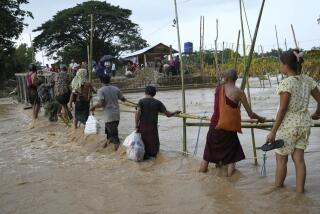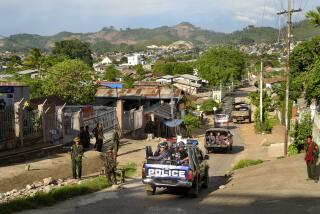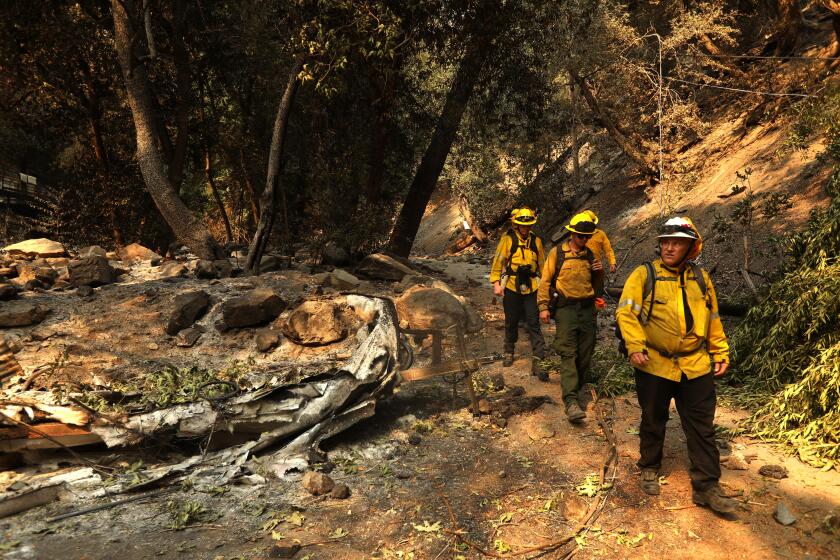Hoofing it through Myanmar’s mountains
Hti Tain Monastery, Myanmar — Our horses arrived in a cloud of dust, clattering on the gravel road. Their manes were a little shabby, their saddles worn, but they looked sturdy and lively, capable of the two-day trek that would take me and my sons, Dow, 8, and Orly, 5, out of Kalaw, Myanmar, and into the pale mauve mountains above.
We were nine months into a year-long trip around Southeast Asia and Australasia, just the three of us. Already, we’d taken risks we would never have taken at home. We had ridden motorbikes in Vietnam, all three squashed onto one, avoiding collisions with kamikaze drivers. We had swum with elephants and cycled through busy city roads to jungle temples. We had dined with Hmong shamans in Thailand, stayed with orphan children in Laos and tramped through killing fields in Cambodia.
Horse-trekking was another risk-filled adventure. Orly had ridden only once, but I watched him clamber confidently onto his horse, slouching like a cowboy with years in the saddle, chatting with Suri, the green-eyed man of Bangladeshi descent who was leading him.
We set off, our destination the Hti Tain Monastery where we would spend the night. The track led us out of Kalaw, an old British hill town on the western edge of the Shan plateau at 4,500 feet.
Cochu, the head guide, was leading our little procession, his face hidden in the shade of his leather hat, a machete swinging from his belt. At intervals he walked alongside the boys’ horses, juggling stones and performing tricks with disappearing sticks.
The scent of sun-warmed leather seeped from our saddles, mingling with wafts of steamy horsehide. Birds flew across a sky that was solid blue but for a few clouds that hovered on the horizon. It wasn’t yet the end of the rainy season in Myanmar.
“It’s not going to rain, is it, Cochu?” I asked.
“Yes,” he said simply. “Later it will rain.”
Sometimes a single downpour here can cause the ground to slide away underneath you. Houses, trees, whole forests can disappear down steep slopes.
“I hope not before we get there,” I said, looking at the steep drop to our right.
“It will,” Cochu replied.
We trekked upward, through thick mud that squished beneath our horses’ hoofs. We passed groves of orange trees and fields of green tea, where women in conical hats harvested the leaves. On and on we trekked, the smell of mimosa and ginger on the wind, our horses never foundering as the sun moved across the sky and the clouds swelled closer. We trekked through hill-tribe villages populated by Pa-O, Danu and Taungthu people, past houses on bamboo stilts and children rolling old tires downhill.
The farther into the mountains we traveled, the thicker the mud became and the darker the sky grew. We were starting to slip and slide. At intervals we dismounted to pull our horses out of the mud. Time became unreliable. One hour, two, then four.
“How long, Cochu?” the boys kept asking.
“Not long,” he replied, as always.
In the opposite direction, a young boy and girl led a grumpy water buffalo. It staggered and slid, its cowbell clanging.
“V.I.A.,” Cochu told us. “Very Important Animal. Without buffalo, we have no rice. Without rice, we have no food.”
As we passed one another on the steep slope the buffalo stopped suddenly and refused to budge. It stood in the middle of the path, steam streaming from its nostrils. The children tugged futilely on the ragged rope. Suri joined them. Cochu joined them. Then I joined them. In the end it took all of us to pull the stubborn creature off our path and up the hill, and by then the sun was slipping beyond the horizon.
We remounted, only to hear a neigh and a stumble behind us, and I turned to see Dow fall off his horse, which was foundering in the mud. Dow’s foot was caught in a stirrup as he scuffled frantically to escape the kick of heavy hoofs. His ribs were bruised. His confidence was rocked. He hid his tears and got back on his horse.
“I’m all right, Mum,” he said. And then my horse slipped, depositing me on a muddy mound.
“Don’t you have to fall off to be a proper rider?” Dow asked, grinning.
I agreed as I remounted.
The clouds were above us now, blocking out the stars and the silver sickle moon. I was beginning to fear the oncoming night, the oncoming rain.
“Are we nearly there, Cochu? Will it rain, Cochu?” we kept asking.
“Yes, yes,” he would reply to both, until finally there was a flicker of lightning that streaked across the sky, then a rumble and a clap. Raindrops cascaded from the heavens, soaking us in moments.
“See,” Cochu shouted. “I told you it would rain.”
I looked over at my boys, their heads tipped back, drinking water from the sky, their expressions triumphant. They had always loved the rain, had always rolled in puddles, had dashed out to be part of a deluge.
“I laugh in the face of thunder,” yelled Dow, bright-eyed and invincible in an Usain Bolt lightning stance.
We rode on, heads down against the wind and rain until, finally, small lights appeared to our right, a beacon drawing us onward.
“See,” said Cochu. “I told you we would get here.”
We reached the monastery just as the lightning and the thunder were directly above us, forking from sky to ground. A monk in maroon robes greeted us and helped us remove our shoes. He led us across a creaking wooden floor to a fire that made steam rise from our damp clothes.
That night, curled on comfy mattresses, fed and watered, warm and dry, we fell asleep to the sound of monks chanting. Our limbs were stiff, our ribs bruised. Perhaps we had been dancing with death, but it hadn’t felt like that. It felt as though we had been living life to its utmost on our trusty steeds as the world passed in a blur of color.
More to Read
Sign up for The Wild
We’ll help you find the best places to hike, bike and run, as well as the perfect silent spots for meditation and yoga.
You may occasionally receive promotional content from the Los Angeles Times.






